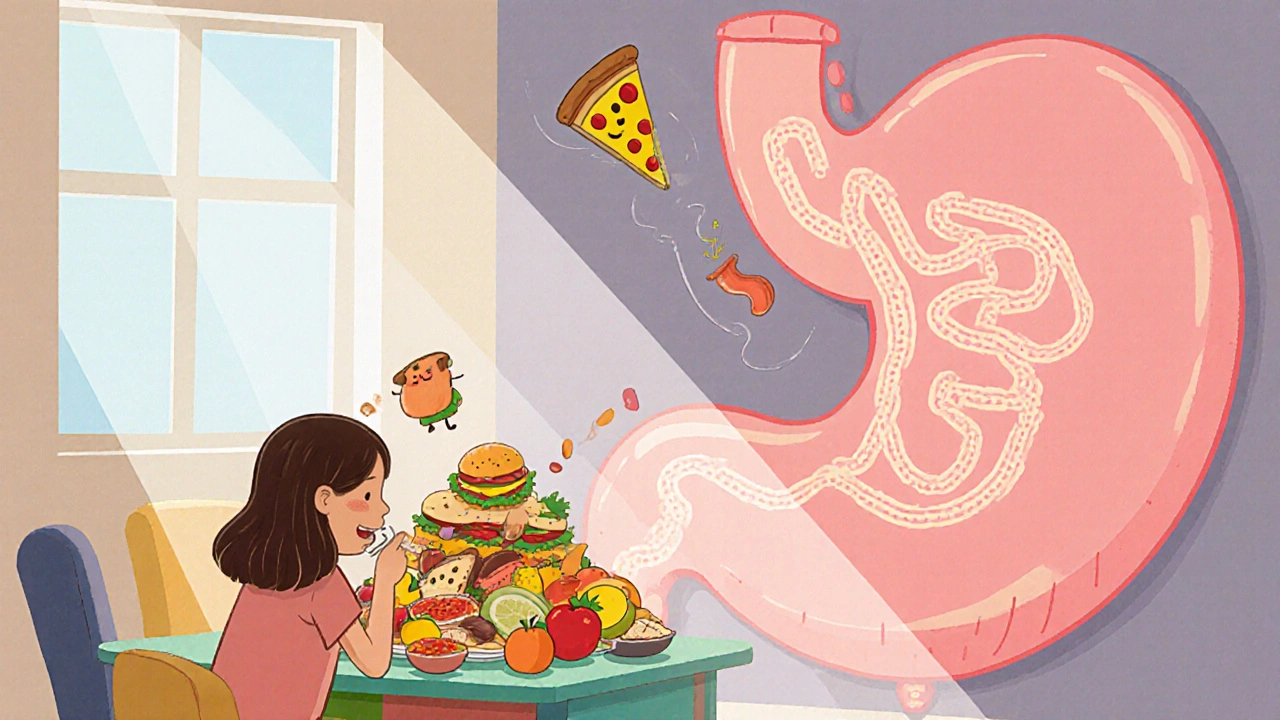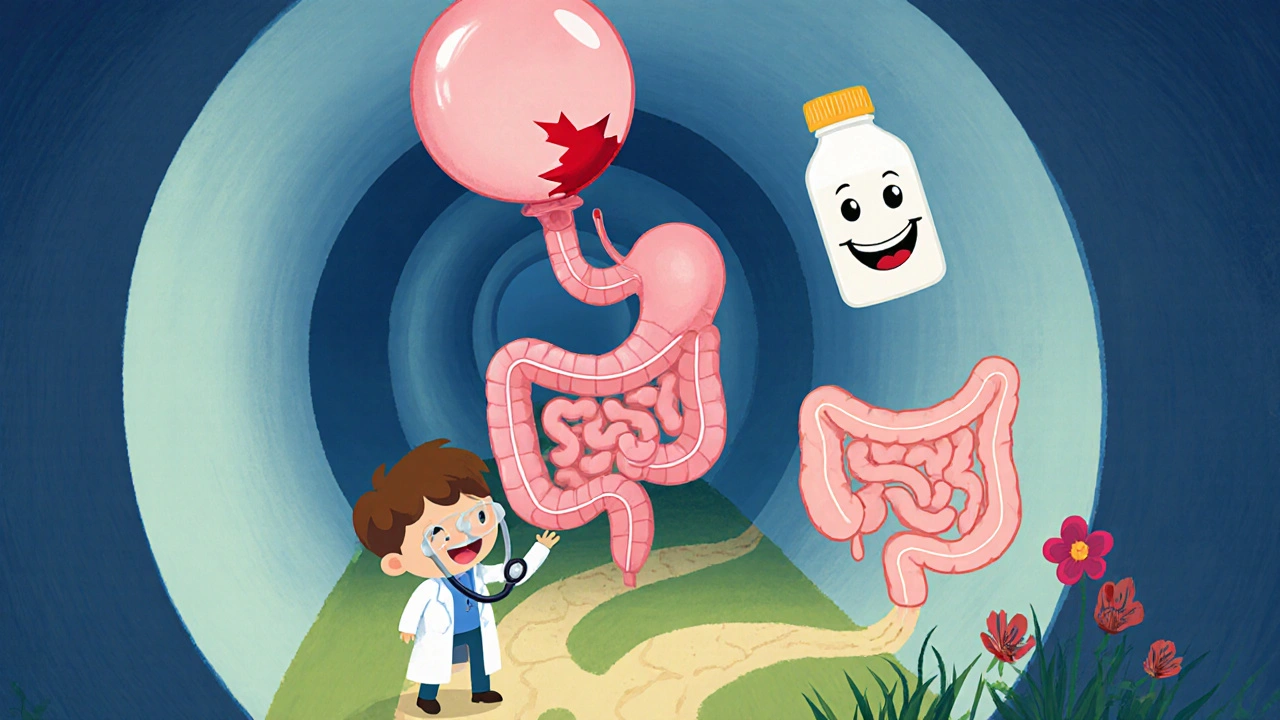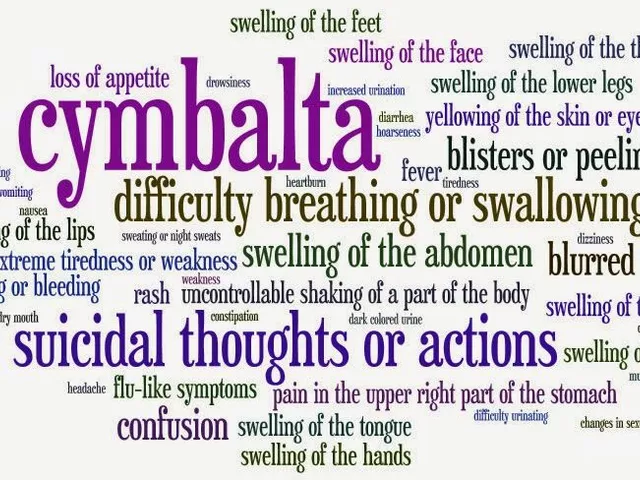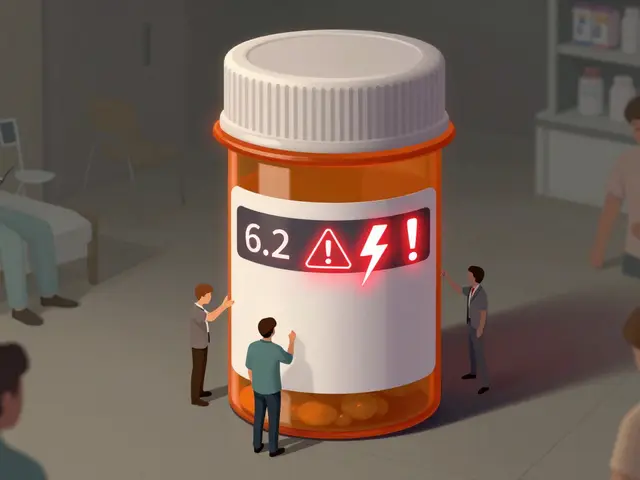 15
Oct,2025
15
Oct,2025
GI Health Risk Assessment Tool
This assessment helps you understand your risk of developing long-term gastrointestinal complications from binge-purge behaviors. Your responses will not be saved or shared with anyone.
Key Takeaways
- Repeated vomiting and laxative use can cause permanent damage to the esophagus, stomach and intestines.
- Chronic acid reflux, gastric dilatation and motility disorders are common long‑term outcomes.
- Electrolyte disturbances from purging affect not only heart rhythm but also kidney and bone health.
- Regular medical screening can catch early signs before serious complications develop.
- Integrated treatment-medical, nutritional and psychological-is essential for lasting recovery.
When binge‑eating meets self‑induced vomiting, the gut takes a hit that can echo for years. This article unpacks how the cycle of bingeing and purging reshapes the gastrointestinal system, why certain symptoms linger long after the behavior stops, and what practical steps you can take to protect your body.
Bulimia Nervosa is a psychiatric eating disorder marked by recurrent binge‑eating episodes followed by compensatory behaviors such as self‑induced vomiting, laxative misuse, or excessive exercise. The repeated exposure of the gastrointestinal tract the pipe that runs from mouth to anus, encompassing the esophagus, stomach, small and large intestines to acidic stomach contents and aggressive laxatives creates a cascade of structural and functional changes.
How Bingeing and Purging Stress the Gut
During a binge, the stomach stretches far beyond its normal volume, often holding 3-4liters of food. The sudden expansion triggers rapid gastric emptying, but when vomiting follows, the stomach is forced to contract violently to expel its contents. This push‑pull action inflames the lining, weakens muscular tone, and disrupts the natural hormonal signals that regulate hunger and satiety.
Purging isn’t limited to vomiting. Laxatives accelerate intestinal transit, flushing water and electrolytes out of the colon. Repeated use can irritate the colonic mucosa, alter the gut microbiome, and impair nutrient absorption.
Acute Gastrointestinal Complications
These issues surface quickly, often prompting emergency care:
- Esophageal tears linear lacerations in the lining of the food pipe caused by forceful vomiting, which can lead to mediastinitis if untreated.
- Gastric rupture, a rare but life‑threatening perforation of the stomach wall due to extreme over‑distension.
- Severe electrolyte loss (especially potassium, chloride and magnesium) that can trigger cardiac arrhythmias.
- Dental erosion from chronic exposure to stomach acid, though not directly gastrointestinal, signals ongoing acid damage.

Long‑Term Gastrointestinal Changes
Even after the binge‑purge cycle stops, many people experience lingering symptoms:
| Complication | Acute Presentation | Chronic Presentation |
|---|---|---|
| Esophageal damage | Micro‑tears, pain, hematemesis | Strictures, Barrett’s‑type changes, chronic reflux |
| Stomach | Gastric rupture, severe pain | Gastric dilatation, delayed emptying, functional dyspepsia |
| Intestinal motility | Sudden cramping, diarrhoea from laxatives | Chronic constipation, small‑intestine bacterial overgrowth (SIBO) |
| Electrolyte balance | Acute hypokalaemia, arrhythmia | Persistent low potassium, bone demineralisation, renal tubular acidosis |
Key chronic issues include:
- Esophageal strictures narrowing of the esophagus caused by repeated scar formation, leading to dysphagia and the need for dilations.
- Chronic gastro‑esophageal reflux disease (GERD) as weakened lower esophageal sphincter muscles fail to keep acid at bay.
- Gastric dilatation persistent enlargement of the stomach that reduces its ability to contract efficiently, causing early satiety or, paradoxically, continued overeating.
- Delayed gastric emptying, which can produce nausea, bloating, and unpredictable blood glucose spikes.
- Intestinal dysmotility, often manifested as chronic constipation or, conversely, alternating diarrhoea from laxative dependence.
- Altered gut microbiota, with reduced diversity linked to mood disturbances and metabolic irregularities.
Systemic Ripple Effects
Gut health doesn’t exist in isolation. Persistent electrolyte loss (electrolyte imbalance disruption of normal levels of potassium, sodium, chloride and magnesium in the body) can weaken heart muscle, increase fracture risk, and impair kidney function. Chronic acid exposure may also irritate the pancreas, raising the risk of pancreatitis over time.
Moreover, the gut‑brain axis means that ongoing gastrointestinal discomfort can exacerbate anxiety, depression, and obsessive thoughts about food-fueling a vicious cycle that hampers recovery.
Screening, Monitoring, and Early Intervention
Because many complications are silent until they cause serious problems, regular check‑ups are crucial. Here’s a practical monitoring plan:
- Baseline labs: comprehensive metabolic panel, magnesium, phosphate, and calcium levels.
- Esophageal evaluation: upper endoscopy if you experience persistent heartburn, pain when swallowing, or voice changes.
- Stomach assessment: gastric emptying study for chronic nausea or bloating.
- Intestinal health: stool analysis for bacterial overgrowth if you have alternating diarrhoea/constipation.
- Bone density scan: DEXA scan every 2-3years if electrolyte disturbances have been chronic.
- Cardiac review: ECG or Holter monitor for arrhythmia suspicion.
Early detection often means the difference between reversible inflammation and permanent scar tissue.

Integrated Management Strategies
Addressing the gut is only half the battle. A truly effective plan blends medical, nutritional, and psychological components:
- Medical care: Correct electrolyte deficits with oral or IV supplementation; prescribe proton‑pump inhibitors for persistent GERD; consider pro‑kinetic agents for delayed gastric emptying.
- Nutrition counseling: Work with a registered dietitian to restore regular eating patterns, introduce fiber gradually, and hydrate wisely to protect renal function.
- Psychotherapy: Cognitive‑behavioral therapy (CBT‑E) remains the gold standard for bulimia; it teaches alternative coping skills and rewires the binge‑purge loop.
- Medication: Selective serotonin reuptake inhibitors (SSRIs) such as fluoxetine have shown benefit in reducing binge‑purge frequency.
Regular follow‑up allows adjustments based on symptom evolution-if GERD improves but constipation worsens, you might shift focus to probiotic supplementation and bowel‑regularising agents.
Practical Tips for Protecting Your Gut
- Stay hydrated with electrolyte‑balanced fluids (e.g., oral rehydration solutions) rather than sugary sports drinks.
- Avoid over‑the‑counter laxatives; use only under physician guidance.
- Eat smaller, more frequent meals to lessen gastric stretching.
- Include gentle chewing and mindful eating to signal satiety earlier.
- Monitor for warning signs: persistent heartburn, vomiting blood, sudden weight loss, or muscle cramps.
Remember, each small change adds up. Protecting the gut now can spare you from invasive procedures or lifelong medication down the road.
Frequently Asked Questions
Can bulimia cause permanent esophageal damage?
Yes. Repeated vomiting can lead to scar formation and strictures that may require endoscopic dilation. Early treatment of acid reflux reduces the risk of permanent changes.
What are the most common chronic GI symptoms after stopping purging?
People often report lingering heartburn, bloating, early satiety, and irregular bowel habits. These symptoms stem from weakened sphincters, delayed gastric emptying, and altered gut microbiota.
How often should I get labs checked if I’m recovering from bulimia?
A comprehensive metabolic panel every 3-6months is advised during the first year of recovery, then annually if electrolytes remain stable.
Is there a link between gut health and mood in bulimia recovery?
Yes. The gut‑brain axis means that dysbiosis or chronic inflammation can worsen anxiety and depression. Probiotic‑rich foods and a balanced diet support both gut and mood.
When should I see a gastroenterologist?
If you have persistent heartburn, difficulty swallowing, unexplained abdominal pain, or recurring electrolyte imbalances, schedule a gastroenterology evaluation promptly.






Bulimia is a cultural disease that weakens the very core of our nation
Sure, the gastrointestinal fallout from bulimia is just another fine example of how our bodies love to over‑react – or so the studies definately suggest. It’s almost poetic how the gut mirrors the mind’s chaos, isn’t it?
Interesting how delayed gastric emptying can persist long after stopping purging; recovery timelines often extend months despite cessation.
Honestly the article just repeats the same textbook facts without any new insight.
Perhaps the real damage isn’t in the esophagus but in the soul’s inability to digest societal expectations.
Even basic reminders can spark change when delivered with clarity.
Love the philosophical spin, though the gut‑brain connection deserves more practical tips. Maybe add a simple breath‑work routine to calm the nervous system – it’s low‑effort and can ease reflux. Dont forget to stay hydrated, that’s key!
Listen up, the long‑term GI fallout from bulimia is basically a ticking time‑bomb for any body daring to ignore it. You’ll see strictures, chronic reflux, and even SIBO whispering sweet nothings in the small intestine. The literature barely scratches the surface because most shy away from the ugly truths. Trust me, I’ve read every paper you could possibly think of.
While your enthusiasm is noted, such hyperbolic language undermines the clinical seriousness required for patient education.
Reading through this, I feel for everyone battling these hidden pains – you’re not alone, and there’s hope on the horizon 😊
Emotional pep‑talk won’t fix esophageal strictures – we need hard data, not feel‑good fluff. Also, your smiley is a bit trite, don’t you think?
Overall the piece provides a solid overview, yet readers should consult a gastroenterologist for personalized assessments.
It’s alarming how many ignore these warnings and continue harmful habits – we must hold ourselves accountable for our health choices.
Oh joy, another article telling us that purging hurts the gut, as if nobody has ever heard that before. Apparently the medical establishment decided to repackage common sense into a glossy PDF for the unsuspecting. While we’re busy counting electrolytes, the hidden agenda might be to keep the supplement industry booming. Did you know that every mention of ‘electrolyte imbalance’ conveniently spikes sales of overpriced sports drinks? And of course, the ghost of a perfectly normal esophagus has been replaced by a horror story of strictures and Barrett’s. The narrative conveniently ignores the fact that many of these conditions could be mitigated by simply eating regular meals. But no, the solution presented is a parade of endoscopies, proton‑pump inhibitors, and lifelong medication. One could argue that this is a clever ploy to keep the pharmaceutical pipeline filled. Meanwhile, the average reader is left with a to‑do list longer than a novel. And let’s not forget the subtle suggestion that mental health therapy is just an optional add‑on. In reality, the gut‑brain axis is a two‑way street, yet the article treats it like a one‑way lane. If you look deeper, the piece reveals a bias toward medical interventions over lifestyle changes. So, next time you see a bullet point about ‘regular follow‑up’, ask yourself who profits from those appointments. Remember, the most powerful weapon against chronic GI damage is informed self‑advocacy, not blind compliance. In short, read between the lines, question the motives, and take charge of your health before the system does. And if all else fails, just keep drinking water and avoid laxatives unless a doctor says otherwise.
Good points, thanks for the thorough breakdown.